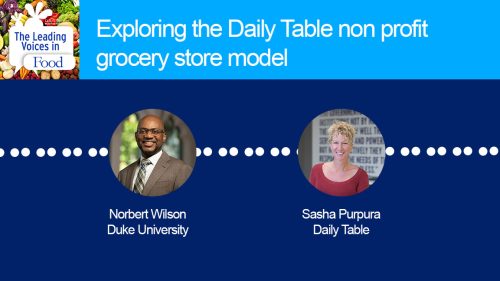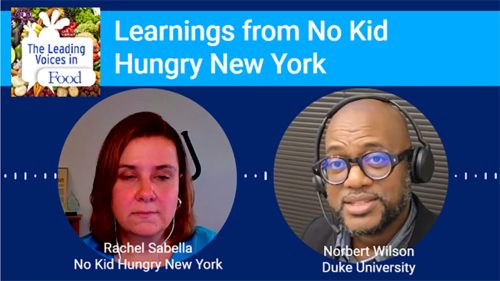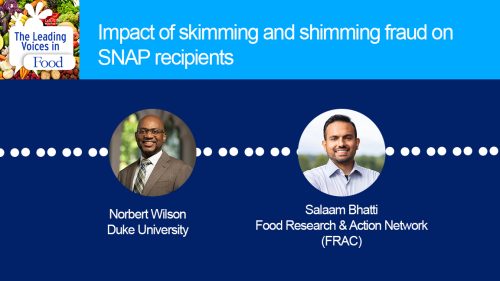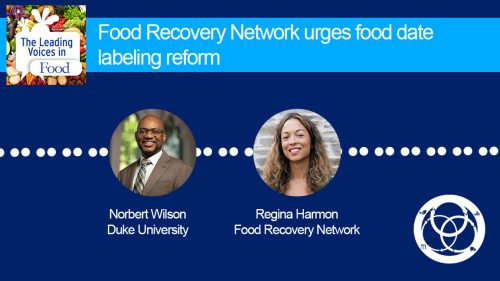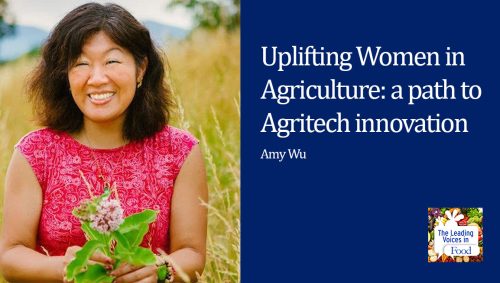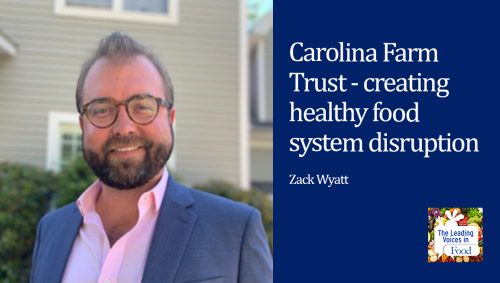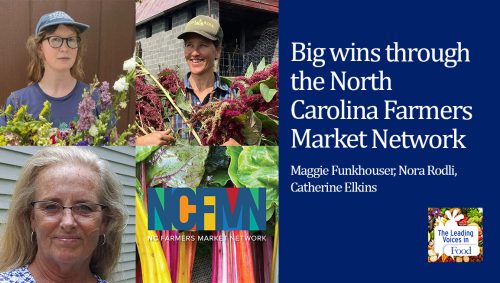The Leading Voices in Food
E163: Malik Yakini on the Inspiration of Urban Ag and Community Self Determination
Today, we’re talking to Malik Yakini, the executive director of the Detroit Black Community Food Security Network, a nonprofit that advocates for access to healthy food in the black community. Malik is a former K-8 school principal who’s also developed a food security curriculum for young people. He is a nationally known champion for food sovereignty and personal food security.
Subscribe: Apple Podcasts | TuneIN | YouTube Music | SoundCloud | PocketCasts | Radio Public
Tags: Equity, Race & Food Justice | Food Insecurity | Urban Agriculture |
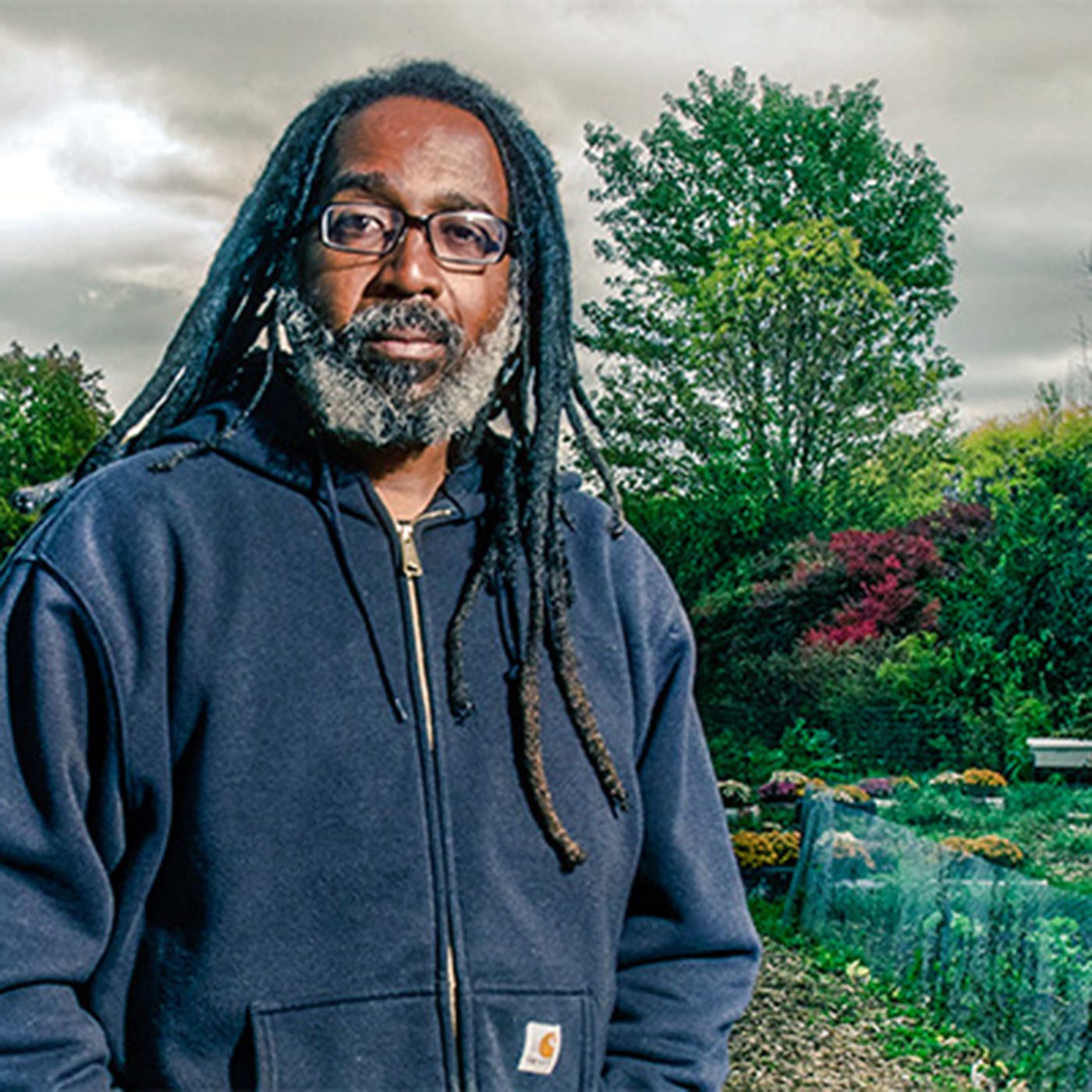
Malik Yakini has been involved in the Black liberation movement throughout his adult life. His resume includes more than 20 years as principal of a K-8 African-centered school in Detroit along with founding the Detroit Black Community Food Security Network, which works to build self-reliance, food security, and justice in Detroit’s Black community. His connection to food work began about 20 years ago, when he began gardening on a small plot of land at his Detroit home to ensure he had access to fresh food. With few full-scale grocery stores in urban neighborhoods and just one national chain located in Detroit, Yakini saw the need to expand this work to community gardens and to teach young people to get their hands dirty. In 1999, he developed a food security curriculum as principal of Nsoroma Institute, an African-centered school that operated in Detroit from 1989 to 2014.
Interview Summary
So I’ve been an admirer of your work for a number of years now and really perceive of you as a pioneer doing important community-rooted work. So let’s start with grounding this conversation for our listeners. Would you share your thoughts on problems with the current food system?
Sure. I think there are multiple problems with the current food system. Beginning with that, we have great inequities within the food system because of the existing inequality in American society, based on economic standing and based on so-called race. And, to some extent, based on geographies – some people have great access to highly nutritious food. Others don’t have so many opportunities. So, for example, in the city of Detroit, where I live, we have a few grocery stores; in fact, we actually have about 70 grocery stores. But most of those are independent smaller stores that don’t offer the robust selection that we see from national stores. So the problem in Detroit is twofold: 1) that is the lack of stores, and 2) even if the store exists a few miles from you, if you don’t have an automobile, you still don’t have access. So these are just a couple of examples.
So we have great inequity in the food system that impacts the health of communities. The second major problem with the food system is that workers within the food system are really exploited and not paid fair wages. So we have food that is subsidized in a sense; subsidized by the exploitations of farmworkers and people working in meatpacking plants and what have you. And so, even though most people would, I suspect, think that they’re paying a high price for food, the reality is we’re not really paying the actual value of food. And we’re externalizing some of those costs.
The third problem with the food system is the environmental degradation that it causes. The industrial food system that produces the majority of food in American society is heavily dependent upon pesticides and herbicides, dependent upon huge amounts of water, huge machinery, and the use of diesel fuels. Farms have to be huge farms for them to survive. And so there are all kinds of problems this causes for the environment, both the runoff of the pesticides and the herbicides into the water systems. And the creation of dead zones – problems created by herding cattle and pigs into small areas and trying to process the waste from that. And the system is not sustainable. We simply can’t continue to feed the Earth’s population using the same kinds of methods that have been used for the last 60 years or so. So those are three of the major problems with the food system. There are many others as well.
When you think about a system so embedded in the American economy and so embedded in the way we’ve constructed racial barriers and inequities in our country, it’s hard to think that you could produce big change in this. And people, when they think big changes might automatically think about big government top-down Washington or state-driven initiatives and things like that. I’m sure there’s a role for those things, and I’ve worked on some things, but there’s also tremendous room for local ingenuity. And very often, I know, at least in the public health arena, what starts locally becomes national before long. And that’s really where the innovation begins. And that’s exactly what you’ve done. So let’s shift now and talk about some of the work that you’re doing. I know that you’ve done crowdfunding campaigns to help black farmers buy land in Detroit and advocated for urban farming, local food, and local growers, particularly during the pandemic. So what are your current efforts?
First of all, I agree with your framing that as we think about how we change the food system – looking at a top-down approach becomes very difficult. There’s been a number of efforts to make a Farm Bill that is more just than equitable. But I don’t know that we’ve seen really significant systems-wide changes due to the Farm Bill. But we can do these things on the local level that create examples of the larger change that can come about. And it can help to shift people’s consciousness about how they perceive and relate to the food system.
So we’ve been doing some of that work in the City of Detroit via the Detroit Black Community Food Security Network for the last 15 years or so. I’ll start with the effort you just mentioned – the Detroit Black Farmer Land Fund. Urban agriculture will not place rural agriculture, but it certainly can supplement it. Urban agriculture grows food closer to where we have population density centers and thus requires less burning of carbon to transport food long distances. When people eat food in closer proximity time-wise to the time it was harvested, they’re going to get food that is better for them and has more nutrients. So we don’t think that urban farming will replace rural farming. We believe that urban farming is a good supplement, and there are some things that we can grow in urban areas, such as Brassicas, collard greens, kale, tomato, and all kinds of things. But we’re not likely to see wheat fields, and we’re not likely to see herds of cattle in the city of Detroit.
We’ve been working with the Detroit Black Farmers Land Fund, which is really an initiative coordinated by three organizations in Detroit: our organization, the Detroit Black Community Food Security Network, Oakland Avenue Urban Farm, and a group called Keep Growing Detroit. And so, we’ve come together to jointly administer this fund. So far, we’ve given away more than $70,000 to about 40 Detroit farmers who have been trying to buy land. Just as in rural areas, obtaining land can often be very difficult for farmers, particularly in a city like Detroit, where we see a tremendous amount of gentrification. Wealthy folks are coming in, buying huge tracts of land, and driving property values up. And so farmers in Detroit often have a hard time owning the land that they’re farming on or finding land even that they can purchase to farm on. So the Detroit Black Farmers Land Fund is an effort to assist Detroit’s black farmers in obtaining land. This year, it’s altered slightly, and grants were also given to building infrastructure. So it’s one thing to have an acre of land in a city or two acres or whatever the case may be. But, still, you also need infrastructure on that land, hoop houses, fencing, water, and all kinds of things that allow you to grow food robustly. So that’s one of the things that we’re very excited about. The second anniversary of the Detroit Black Farmer Land Fund is coming up in June of this year. So I’m looking for that continuing to expand. Also, that effort has inspired other folks in other parts of the country. Particularly in Michigan, where we see in the neighboring county, Washtenaw County Black Farmer Land Fund, which, of course, is influenced by the work they saw happening here in Detroit.
The second thing that we do and perhaps that our organization’s best known for is that we operate D-Town Farm, a seven-acre farm in a city-owned park in the city of Detroit where we grow more than 40 different fruits, vegetables, and herbs. And probably more important than the amount of food that we produce, we’re planting seeds in the consciousness of Detroiters about the role that urban agriculture can play as we rethink what the city of Detroit can be and as we rethink how we improve public health. So at D-Town Farm, we do lots of tours for school groups, university groups, Boy Scouts, Girl Scouts, who are being exposed to urban agriculture often for the first time. And they’re able to see the techniques that we use and can hear the ideas that drive the work we do at the farm. We do large-scale composting. Soil health is the most important factor in making sure that we have nutrient-dense food. So we do large-scale composting to regenerate the nutrients in the soil at our farm. We also have three hoop houses that we use for season extensions. We also have public events at D-Town Farm, designed to get children and families to come to the farm who might not necessarily be ready to volunteer and put their hands in the soil, but who are interested in being outdoors and learning about the possibilities of urban agriculture. So we have a number of events throughout the year, such as something in April we call the Bio Blip, where students from the University of Michigan who are studying in the School of Natural Resources come out and bring magnifying glasses, microscopes, specimen bags. They lead a group of about 100 children. They identify all the fauna, flora, and fungi at the farm. And it’s wonderful, by the way, to see children from the city out at the farm, reconnecting with nature. We have a harvest festival every fall where we have close to 1,000 people who visit the farm. We have workshops, speakers, food demonstrations, tours of the farms, live music, a farmer’s market, and all kinds of things that can expose the public to the great potential of urban agriculture.
We also have a youth program called the Food Warriors Youth Development Program that functions at two sites in Detroit. One site is a church, and that site functions on Saturday mornings and is open to any children in the city of Detroit between the ages of seven and 12. The second site is the school site on the east side of Detroit, and that program is only open to students who are enrolled at the school and it functions as an afterschool program. So at both sites, we have raised beds. And we teach the children how to build those raised beds, how to cultivate the food, and how to harvest the food. Then they also learn about food justice concepts. Our organization thinks that our culture is very important. And that African American people have gone through a process caused by our enslavement that has intentionally disconnected us from our traditional culture. We think it’s very important that we reconnect children of African descent with traditional African cultural concepts. As well as giving them an understanding of the role that African Americans have played in the development of agriculture.
And then the third major thing that we’re doing is the Detroit Food Commons, a new 31,000-square-foot building that we’re building on Woodward Avenue, the main street of Detroit. It’s about a $20 million project. The Detroit Food Commons will house the Detroit People’s Food Co-op, a cooperatively owned grocery store, which we also initiated. Although we initiated and continue to influence it, it’s an independent body with its own board. And that board regulates what will happen inside that grocery store. The first floor will be the cooperative grocery store. Still, we’ll have four shared youth kitchens on the second floor of the building, about a 3,000-square-foot community meeting space, and office space for the Detroit Black Community Food Security Network. So again, we’re looking forward to the opening of this in June of 2023, and we think want to be a game-changer in Detroit on several levels. One, it is a cooperatively owned business that pushes back against the gentrification that we’re seeing in Detroit, where generally, very wealthy white men lead all of the development that we see happening in Detroit. And then we’re supposed to see that as progress because we can walk into these edifices that wealthy white men have created and spend our money there where the community has really no ownership. And there’s very little circulation of wealth within our community. The cooperative ownership of the grocery store, on the other hand, does provide for ownership by community members. We currently have 1,437 member-owners of the Detroit People’s Food Co-op. That’s one reason it’s important, the cooperative ownership structure and how that pushes back against the typical style of development that we see happening in Detroit. It will also be a game-changer, though, because of the neighborhood that we’re building in, which is called the North End. It has a tremendous lack of access to high-quality food. And so it’s going to provide high quality, often locally-grown food for residents of that community and Detroiters in general. There’s a vast number of people who live in the suburbs north of Detroit who work in Detroit and leave the city each day, driving down Woodward Avenue. We’re also hoping that an audience will shop at the Detroit People’s Food Co-op before going back to their homes in the suburbs. The third way it will be a game-changer is to provide a consistent retail outlet on a scale that was previously unavailable for local growers. And so, we are very much conscious of our role in helping to catalyze the urban agriculture movement by providing this consistent retail outlet.
Malik, that’s a jaw-dropping array of things you and others in Detroit are doing, and I can’t tell you how inspirational it is. Let me bring up one in particular, and it has to do with your focus on youth. Given your background as an elementary school principal, I could see why that would be a focus for you. But you could see how involving youth in this would help address the issue of getting people interested in farming and interested in other parts of the supply chain. As I imagine as the Commons comes online, youth being involved in that might give them ideas for becoming food-related entrepreneurs. The space that you have upstairs could be used for youth to develop ideas and for new businesses and things like that. I could imagine inspiring a whole new generation of people to think about these food-related activities as a viable career path, and I’m just wondering, have you seen signs of that so far?
Since we started 15 years ago, we’ve seen a tremendous interest on the part of young people in being involved in the food system. We have something in Detroit, for example, called the Detroit Food Academy, which is a nonprofit that trains people for jobs within the food system. They learn a wide array of fields and areas within the food system where there are employment possibilities. We have a number of farms in Detroit that are encouraging children to anticipate those farms. We have some children, in fact, who have created value-added products that they’re selling at various fairs and the farmers’ markets throughout the city of Detroit. So yeah, we do see an increasing interest. Part of what we’re setting out to do is first to help people think about the food system because the average person, people who aren’t food activists, don’t even use that term, the food system. That’s not how they think about food. They’re thinking about, “I’m going to the grocery store to buy what I want. I’m going to cook dinner, and I hope I like the way it tastes,” and that’s the kind of framing the average person has about food. So part of what we’re trying to do with both children and adults is getting them to think about this broader system that provides food and all of the kind of steps in it from the seeds to the planting of those seeds, the cultivation of the crops, the processing of crops, the aggregation of crops, the distribution, the retail level, the post-consumer level. We want people to think about all of that and then think about how they begin to develop agency within it so that they don’t just see themselves as subjects that this more powerful system is acting upon, but they see themselves as having the agency to actually shape that food system as it impacts their community. And so that’s part of what we’ve been trying to do with the work of the Detroit Black Community Food Security Network, working in a number of areas both in policy and farming, in retail, trying to get people to really conceptualize what this food system is and that they have the right and the responsibility to help shape how that food system impacts them. So, yeah, we’re seeing interest by youth, and we are hoping that the kitchens on the second floor will inspire not just youth entrepreneurs but also adult entrepreneurs. And there are a number of people in Detroit who participate in what we call the shadow economy, people who are making money in ways that are outside of the laws of the society. For example, you have a number of people who are preparing chicken dinners and fish dinners or perhaps soups and cakes and selling them. The kitchens on the second floor of the Detroit Food Commons allow those entrepreneurs to go from being underground shadow economy food entrepreneurs to actually coming into the legitimate legal economy by having a licensed kitchen where they can prepare their foods. So we are definitely looking to stimulate the local food economy both for children and adults.
Let’s talk a bit more about that. So in some of your beginning comments, you mentioned low wages as one of the fundamental problems in the food system. Are you hopeful that this series of activities will provide better pay opportunities for people?
I’m hopeful, but I also want to acknowledge that it’s a very difficult problem. And even as we look at the Detroit People Food Co-op and how to make that cash flow positively, as we look at the performance and all of the expenses, the wages that we’re scheduling to pay employees are certainly not what we would like to pay. And so we’re strategizing on how with very thin margins in the grocery industry, we can be fairer and just to the workers who will work in that store, but this is not a unique problem that we have. In fact, I would say that the major dilemma facing the food movement in American society is figuring out how we pay workers within the food system a fair and just wage while, at the same time, we make sure that we have food that is available and affordable to everyone in society, regardless of their race, income, or geography. It’s a very difficult nut to crack, and I’m not absolutely positive that it can be done within the current economic system, but it’s certainly something that we have to strive for and that we have to strategize on. I don’t think there’s an easy answer to that, but it’s the question that we have to constantly put in front of us. For me, the obvious answer, though, is that we have to marry the struggle for food justice with the struggle to eliminate poverty. The answer to this problem is not cheap food per se. The answer to the problem is paying the true value of food but making sure that everyone has the income which is necessary to buy high-quality food.
Let me ask about the importance of community ownership of these things. So let’s just say hypothetically that all the activities that you’re talking out were being put in place from Washington or the state of Michigan, let’s say, as opposed to a very community-involved effort. What’s the symbolism of that, and what difference do you think it makes in the way people think about these things?
Well, I think it makes a huge difference, and again, part of what we’re trying to instill in people is a sense of agency. I think it’s true to say that in American society in general and in Detroit in particular, people have been locked into a lethargy where they think that people who are more powerful are in charge of structuring their lives, that the educational system is responsible for teaching our children, for example, and that doctors are responsible for maintaining our health. And in many ways, we’ve ceded responsibility for our own lives to these forces that we perceive as being more powerful and particularly in a place like Detroit, where, over the last 20 years or so, we’ve had the imposition of what the state of Michigan calls emergency managers. The largest or most well-known in the position of the emergency manager was in Detroit just before the city declared bankruptcy. The governor essentially suspended the powers of all of the elected officials and appointed one individual who was the emergency manager of Detroit. These powers superseded all the powers of the elected officials, so essentially, democracy was put into a coma in the city of Detroit. So I’m saying that in a situation that both intentionally disempowers people and also where people cede responsibility because they perceive these more powerful forces as being more qualified to run the systems that impact our lives, people have given up; in many cases, their agency over defining not just the food system that impacts their lives but defining all of the systems that impact their life. And so we’re very concerned about developing a sense of community self-determination that every community first decides what their own goals and aspirations are and then decides how they reach that as opposed to external forces coming in and dictating to communities how they should move and develop, and so that’s really at the core of what we’re doing. So having these community-based projects that mobilize community members and ignite within them this sense of agency both within the food system, and then we’re hoping that also as people see that we can exert control over the food system, they begin to look at other aspects of their lives as well and how we can, as a community, begin to exert control over those things. So having said all that, that’s not to say that state and federal governments don’t have the responsibility of behaving in a way that facilitates justice, equity, and access to high-quality food for all of their citizens. Still, I certainly don’t think that we should put the majority of our efforts into that and that we shouldn’t wait until those governmental entities act to make things better. We have the right and the responsibility to act on our own behalf while, at the same time, pressuring and urging the government to act in a responsible way.
That makes perfect sense. And I’d imagine another virtue of the community ownership part of this is that the initial innovation breeds more innovation because more and more people think that they can have the agency that you’re talking about, come up with new and creative ideas. So I could imagine this building on itself over the years.
Yes, absolutely. I think that mobilizing people to solve their own problems certainly stems from innovation. The challenge is that often, very creative, innovative people in communities like the community I live in don’t have the resources to implement those innovations. So we have to always look at that side of the equation also. How do we better resource communities so that the people who have the lived experience and who are most impacted, and who have this tremendous creativity, have the resources that are necessary to bring these ideas to scale, so they have a larger impact?


